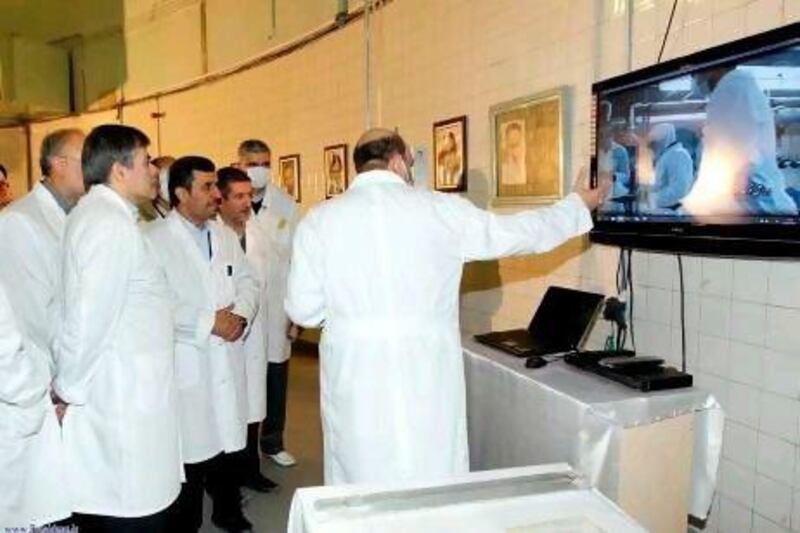Iran and the White House have swiftly denied a New York Times report that they had agreed to hold direct talks to resolve the crisis over Tehran's nuclear ambitions after next month's US presidential elections.
But both also expressed a commitment to a diplomatic solution between Iran and six world powers. Talks are expected to resume in November or December after months of stalemate.
It is not implausible that historic, direct talks between Iran and the United States could yet take place on the sidelines of that process, analysts said.
The White House's denial noted that US officials had said "from the outset that we would be prepared to meet bilaterally".
The New York Times reported on Saturday that Tehran and Washington had agreed "in principle" to one-on-one talks after secret exchanges between US and Iranian officials that began early in Barack Obama's term as president.
Al Monitor, a website with in-depth coverage of the Middle East, said yesterday that the White House adviser on non-proliferation, Gary Samore, had been in "authorised back-channel talks with an Iranian official posted to Turkey".
The reports come at a pivotal moment in the US presidential contest. Tonight, Mr Obama is set to face his Republican challenger, Mitt Romney, in their final debate, which will focus on foreign policy.
Some Iran analysts saw the Times story as an "opportune revelation" to boost Mr Obama tonight. Others suspected it was a "hostile" leak to sabotage a back channel Washington opened to Tehran.
The prospect of direct talks has the potential for Mr Obama to argue he is nearing a diplomatic breakthrough in the increasingly high-stakes nuclear standoff, but could pose a risk if Tehran is seen to be using them to buy time.
Mr Romney has repeatedly accused Mr Obama of being weak on Iran, although he has not outlined what he would do differently.
Yet the Republican nominee may not want to be seen condemning the idea of direct negotiations for fear of appearing keen for another conflict at a time many Americans are suffering war fatigue.
The New York Times, attributing its information to unnamed government officials, said Iran insisted that talks wait until after the US presidential election on November 6 because it wanted to know with whom to negotiate.
Iran's foreign minister, Ali Akbar Salehi, said yesterday that nuclear talks were ongoing with the so-called P5+1, which consists of the five permanent members of the United Nations Security Council and Germany. "Other than that, we have no discussions with the United States," he said.
A day earlier, the US National Security Council spokesman, Tommy Vietor, said: "It's not true that the United States and Iran have agreed to one-on-one talks or any meeting after the American elections."
Iran watchers have long believed only Washington can give the Iranian regime the security guarantees it needs to persuade it to curb its cherished nuclear programme, which Tehran insists is solely peaceful in nature. Conversely, they say, Washington needs Iran to deal with issues such as non-proliferation, Iraq, Afghanistan, Syria and the Palestinians.
The New York Times said it was unclear whether Iran's supreme leader, Ayatollah Ali Khamenei, had signed off on the effort, even though the understanding was reached with officials who report to him. The ayatollah is mistrustful of "the global arrogance" of America. But Iran, suffering its worst financial crisis in decades as western sanctions bite deep, may feel under domestic pressure to make a nuclear compromise.
The Iranian currency plunged by nearly 40 per cent in value against the US dollar earlier this month, triggering rare street protests.
Better relations with Washington would be popular with most Iranians. At the same time, however, Ayatollah Khamenei will be averse to Iran entering talks from a position of perceived weakness.
The Guardian reported this month that the six world powers - the US, Russia, China, Britain, France and Germany — would launch a diplomatic drive after the US election to end the deadlock.
This would offer some relief from sanctions in return for Iran limiting the level of enrichment of its uranium stockpile. The New York Times said the US administration was considering a "more for more" offer - more restrictions on Iran's enrichment activities in return for more easing of sanctions.
The diplomatic opening will probably close again in the spring when the Iranian leadership is likely to become distracted by the campaign for Iran's own presidential elections in June.
Muhammad Sahimi, an Iran expert at the University of Southern California, believed the story.
"Both sides deny the report but that is just political posturing," he said. "Iran wants a deal and Khamenei is afraid of street riots in a few months when the effect of sanctions and economic mismanagement become even worse."





